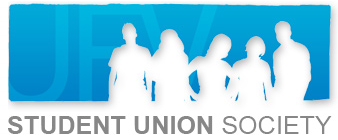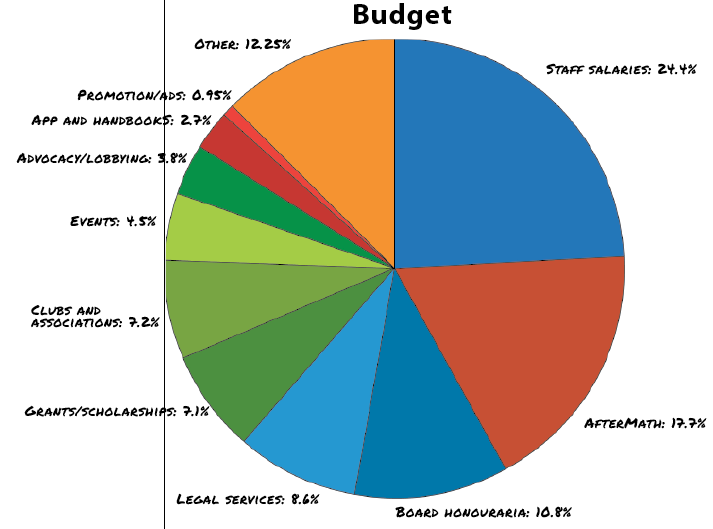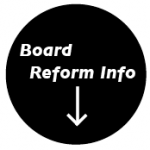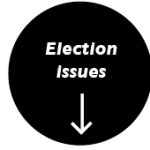By Cascade Staff – Email
Print Edition: February 26, 2014
For the student union society (SUS) all-candidates debate ahead of their annual elections, the question wasn’t only what people in the run for board positions were saying, but if anyone would hear them.
Responding to a question about each new job’s potential difficulties, VP internal candidate Thomas Davies was unequivocal.
“It can only be student engagement,” he said. “We have about just over 9000 students … [and] it’s not enough, in my opinion, to have 300-odd people voting in our election. It’s not ideal to have 500 people voting in referendums.”
A lack of student involvement in politics is not a problem specific to UFV, but it’s also particularly evident on the ballot. By the numbers, this year’s electoral candidates have slid from last year’s 21 to this year’s 12. Following a restructure of the board last month that has reduced the number of executive positions from six to three, this may have been expected, but there are also no candidates for the positions of graduate studies, trades, or access and open studies representative.
VP external candidate Dylan Thiessen addressed this in his closing statement, framing it as a problem if students do not have enough choices.
“I find it unfortunate that there are three executive positions available, and we only have a total of four candidates,” he said. “The representative positions are a little better, but still two out of five positions are being run uncontested.” Thiessen had no problem with the system of SUS elections though, adding, “I’m glad that students can vote yes or no for uncontested candidates, thereby confirming everyone is truly elected in.”
The downsized debates (executive positions only), and low attendance (three outgoing SUS members, two student media members, two students in Abbotsford) made the issue of student engagement even more apparent. Each candidate had ideas related to changing this.
VP external candidate Jarret Bainbridge, carrying over from his work as interim VP east (Chilliwack and Hope), was confident in advertising tools like the SUS mobile app, and considered adding the ability for students to comment on decisions on the SUS website a way to open up lines of communication. All candidates cited events and talking to students on campus as other ways SUS is promoting itself.
Ryan Petersen, running for president, is most familiar with the way SUS works, having served as a representative for five years and VP finance for one.
“My main stance for the society is to strive toward stability,” he said, also counting communication and the preservation of internal memory as key to what he would hope to do if elected.
Davies, who worked with Petersen on the most recent SUS budget and was also involved with the board’s restructure, echoed those sentiments.
“We really need to make sure the knowledge gained over a year is not lost,” he said.
Though Bainbridge and Thiessen are running against each other, both came out in favour of continuing as members of the Canadian Alliance of Student Associations (CASA) and working with the more recently created Alliance of British Columbia Students (ABCS) to advocate for students in matters of federal and provincial education funding.
“I believe our post-secondary education in B.C. is in serious need of advocacy, support, and reform,” Thiessen said, before suggesting that the possibility of SUS-offered bursaries would be something to explore.
During the question period, one student suggested the Abbotsford campus pub, AfterMath, is most students’ main knowledge of SUS’s existence, and asked what candidates would change or improve about its operations. Since the transformation of the pub’s staff into student positions at the beginning of this academic year, there have been multiple changes in management and temporary closures when staff members are ill.
“I think one of the best things the society as a whole can do is find an effective manager of that service,” Petersen said in reply. “It is not my position or any of my other fellow candidates’ positions to run that service on a day-to-day level.”
Voting period for the SUS elections is February 26 through March 5, and can be done online via myUFV.
You know those fees that show up every time you register for courses? SUS figures pretty heavily in that list: there’s one each for the Abbotsford-Chilliwack connector shuttle, U-Pass, Student Union Building, Health and Dental plan, and the standard SUS fee. The first four are self-explanatory — you know what they’re for. The SUS fee is more complicated. The people you have the option to vote into student government will be in charge of $640,000 collected via that SUS fee (as well as revenues from Coke machines and ATMs on campus). Below is the breakdown of what is allocated where, according to the 2013-14 SUS budget. Next year’s will be approved at the March 12 annual general meeting.
What’s different about the candidates?
SUS is undergoing a restructure of their board. In an attempt to hold themselves more accountable and lessen the pressure of holding an elected position and completing work hours, SUS passed board reform at their January extraordinary general meeting.
What does it mean?
It means there are now three executive positions (down from six). These positions oversee SUS’s day-to-day activitiesby delegating to hired directors. The director positions will be taking on the workload currently executed by elected reps on the SUS board.
As well, the elected executive team will sit on a SUS board now designed to represent the departments at UFV. Seven faculties, six other representatives, and three SUS executive members make up the new oversight body. It is at this level that decisions will be made.
Why does it matter?
It allows SUS to divide labour more evenly across the board. The board will make decisions and SUS employees will carry them out. A hierarchal system is put in place that represents the breadth of UFV’s programs, so more students will be considered. However, as highlighted by the candidates statements, these positions are being run for mostly uncontested. This board structure benefits from full participation, which we are not seeing this election season.
Where’d the reps go?
The old positions of clubs and association representative, aboriginal representative, accessibility representative, etc. have been reorganized into different positions in the SUS structure. Aboriginal rep is the only elected position that has been carried over to the oversight board. The other rep positions are now divided by UFV faculty (i.e.: college of arts, faculty of science, etc.) Directors of engagement, equality, finance, and clubs and associations are all hired positions in the new structure and will take on the tasks currently performed by community reps and reps-at-large. As well, the old VP finance position has been absorbed into VP internal. One thing consistent between the old structure and new structure: trades and technology students as well as the faculty of graduate studies are not represented — before because there were no rep positions for them, now because no students are running for them.
There are major issues going into any election, and the microcosm of SUS elections is no different. Below is a run-down of the issues facing both the current board and the coming board.
The Martel Motion
Jennifer Martel, president of UFV’s biology and chemistry students association, proposed a motion that would see SUS spend at least 55 per cent of their budget on student services. The motion was brought forward at SUS’s January EGM, but wasn’t added to the agenda when the chair ruled there wasn’t enough advance warning. Will this motion come up again at SUS’s annual general meeting? Is the student body interested in seeing the SUS budget divided this way?
Advocacy — provincial and federal
SUS is currently involved with both the Canadian alliance of student associations (CASA) and the alliance of British Columbia students (ABCS). CASA operates on a federal level, while ABCS operates on a provincial level; both advocate for students at their respective levels of government. The years-old question is how useful is it to be involved in either? ABCS is free, while SUS pays membership fees to be involved in CASA and has an option to be a full member or an associate member. How large should our role be in these organizations, if at all, and is it worth what we pay?
Transparency and communication
With the launch of a new website last year, SUS entered a period where minutes were haphazardly posted to the website, when posted at all. As of print deadline, the most recent minutes posted to the SUS site are from their
December 17 meeting, missing the record of January’s single regular board meeting and EGM as well as two February meetings. Committee meeting minutes have been promised to The Cascade, but have failed to appear. Minutes may sound boring or inconsequential, but are the main way a regular student (who can’t or won’t spare up to three hours of a Friday at a SUS board meeting) can keep in touch with the decisions SUS makes and the participation of SUS board members in discussion. Candidates often promise to be more transparent and communicative than ever before, but do little to back up this claim.
Candidate Statements
 Ryan Petersen – Presidential candidate
Ryan Petersen – Presidential candidate
• Has been involved with SUS for six years: five as rep-at-large and one as VP finance
• Has helped with new student orientation for a number of years, volunteering with Student Life
• Would concentrate on making sure old projects carry through the newly reformed board
 Jarret Bainbridge – vice president external candidate
Jarret Bainbridge – vice president external candidate
• Joined SUS last year as a rep-at-large and later took on the role of interim VP east
• Is behind SUS’s app-based treasure hunts
• Was the winner of the Abbotsford News’ “The Freshman” contest
• Wants to run a campaign to “Get Out the Vote” and stress the importance of voting federally for students
• Wants to run small events across all campuses rather than big events
 Dylan Thiessen – vice president external candidate
Dylan Thiessen – vice president external candidate
• Joined SUS six months ago as part of the advocacy committee
• Volunteers with Abbotsford Community Services in the diversity education and resource services department
• Helped with the opening of the community food room and would oversee its transfer to the SUB next year
• Would work to bring new speakers to UFV, continuing in the speaker series that brought David Eby and Stephane Dion to campus
• Would continue SUS’ current relationship with the Canadian Alliance of Student Associations (CASA) and the Alliance of
British Columbia Students (ABCS), which he believes is beneficial
• Would help promote the federal election of 2015 on campus, potentially with on-campus voting stations
• Would focus on running the weeks of welcome events and getting SUS more involved in club and association events.
 Thomas Davies – vice president internal candidate
Thomas Davies – vice president internal candidate
• Joined SUS last year as rep-at-large, is the vice-chair of the finance committee, and served as interim VP finance last summer
• Is a member of the SUS budget committee, the board reform committee, and the UFV student health committee
• Also has board experience with the Chilliwack Academy of Music and Secondary Characters Musical Theatre, UFV’s Business
Administration Student Association, and is a top-tier soccer referee
• Helped conceive the proposed SUS entrance scholarship, and supports building other funding opportunities for students
• Would submit monthly financial reports to the SUS board and quarterly financial reports to students
• Committed to releasing minutes and other information to students “as soon as possible,” though without a time- based deadline






